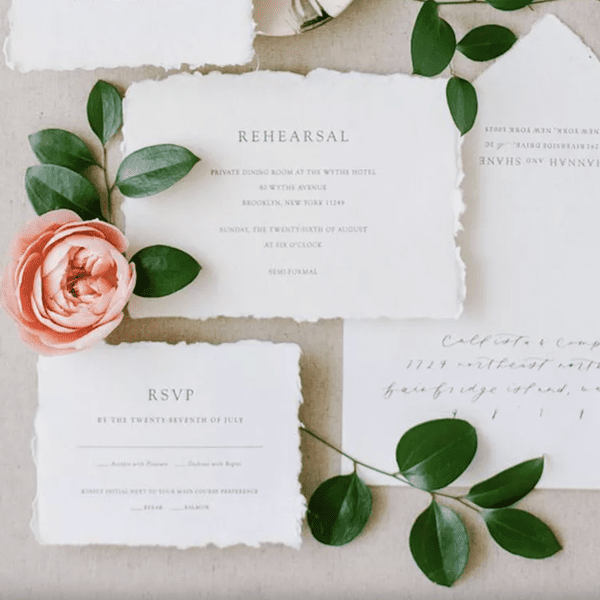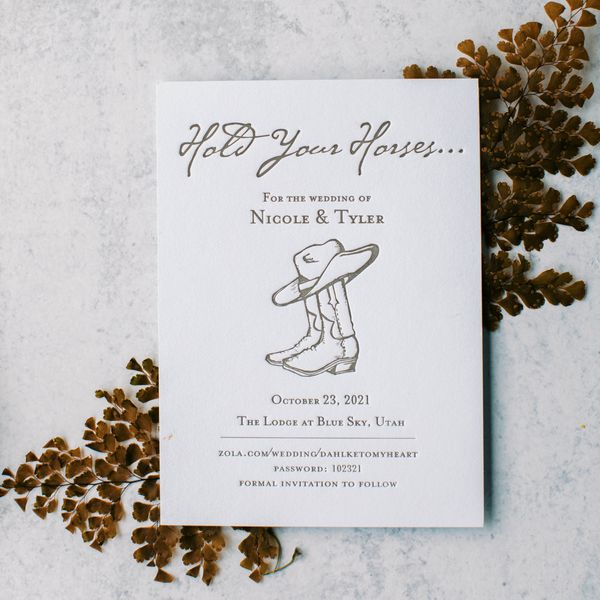:max_bytes(150000):strip_icc()/01-RSVP-No-Wedding-Elizabeth-Warrick-Main-adda2d2acb3c4ad3ab932667e2498101.jpg)
Photo by Elizabeth Warrick
Sending out your wedding invitations is one of the biggest parts of the planning process. Not only do your invites set the tone for what guests can expect, but once they're out in the world, you and your partner can officially kick off the countdown to your big day. That being said, even though the invitation process is an exciting moment while wedding planning, things may start to get stressful once people start sending their RSVPs, especially if those responses are a "no."
Though it may seem confusing, and even hurtful, to receive a "no" RSVP, etiquette expert and event planner Jenny Dreizen shares that it's essential to not take it personally. “It's important to remember that an invitation is simply that; there is no social bond made with the sending of an invite,” she says. “Your guests are not obliged to attend.” And while most guests will do everything they can to be there on your special day, the reality is, you’re bound to get a few “nos” among the “yes” RSVPs.
The planner also adds that you should resist the urge to ask someone why they can't attend your celebration. “It's not your business why someone can't or won't attend, and you should not bring it up with them. There are so many reasons that have nothing to do with you or your event that someone might not be able to join your party, and if they want to share that reasoning they will, probably on their own," she explains.
Meet the Expert
Jenny Dreizen is an etiquette expert, professional wedding officiant, and co-founder and COO of Fresh Starts Registry.
With all this in mind, if you're at a complete loss as to why someone sent a "no" RSVP, we asked Dreizen to help explain the top 10 reasons guests decline wedding invitations. Read on for more.
:max_bytes(150000):strip_icc()/St.Chelle-MichellePullman-CasiandJake--3-b7dd350464c94ecab97a53072db3297e.jpg)
Photo by Michelle Pullman of St. Chelle
They aren't able to travel.
Travel, whether it’s long-distance or a short flight to your chosen venue, isn’t always accessible for everyone due to financial reasons, family responsibilities, work schedules, and more. While some guests will try to make a difficult travel situation work, most—especially those who aren't a part of your immediate family—will RSVP "no" to your wedding if it's too hard for them to arrange their plans.
They have a scheduling conflict.
Wedding season is a super busy time of year, as the majority of nuptials happen during the summer and fall when schedules are packed with events, vacations, and back-to-school preparations. Meaning, if your celebration is happening during an extremely busy season, chances are you'll receive a few "nos" from guests who've already committed to other plans. “They may simply have another event that day!” says Dreizen. “There are only so many viable event days in a year, so the chances of two happening on one day is real.”
They don't have childcare.
One of the main reasons why people RSVP "no" to a wedding is due to a lack of childcare. This is especially relevant if they've been invited to an adults-only wedding, which has become more and more popular throughout the years. While it's your right to host a celebration sans kids, if guests have children and aren’t able to find someone to watch their baby, toddler, or teen—particularly if they’re traveling—it's understandable if they aren't able to attend your big day.
They can't afford it.
Between plane tickets, rental cars, hotels, and a new outfit, weddings are expensive no how you put it. In fact, the cost of attending a wedding has skyrocketed as of late—in 2023, the average cost was $611 per event—making attendance difficult for those on a budget, or for those who have multiple weddings per year. Sometimes a wedding and its accompanying costs just don’t fit within someone's budget, but that doesn’t mean the invitee doesn’t want to be there.
They weren't given a plus one.
Creating a guest list is hard! There’s never enough room (or budget) for everyone you’d like to invite, so it’s okay if a few invitees don’t get a plus one. That said, this may mean your college roommate or favorite coworker won’t attend your big day. “Sometimes traveling for or attending events alone is scary, difficult, or unfeasible for so many reasons, ranging from safety concerns to social anxiety to finances,” says Dreizen. “When you invite someone without a plus one, especially if that leaves a person needing to travel alone, pay for a hotel on their own, or be in a social situation without a date or friend, you must be all right with them declining the invitation.”
:max_bytes(150000):strip_icc()/2-colorful-palm-springs-wedding-invitations-move-mountains-co-0324-b9210436e99f4102bc6d8ac028142db1.jpg)
Photo by Move Mountains Co
They don't know you very well.
Maybe it’s a neighbor, a new friend, or a friend of your parents. If they don’t know you as well as the other guests, they may feel uncomfortable in a crowd of your nearest and dearest, though they’re probably flattered to receive an invite in the first place. “Even at their most local and accessible level, weddings are still a time and financial investment,” says Dreizen. “A wedding where one doesn't know the couple very well might also mean they won't know many other guests, so depending on social comfortability, this is a very valid reason someone may RSVP 'no' to a wedding.”
They received your invite too late.
Traditional etiquette recommends you send invites six to eight weeks before the ceremony so guests have adequate time to plan. But, life happens, and sometimes an invite shows up too late for the invitee to make it work, especially if they have to coordinate travel or childcare. To avoid this (if you haven't sent out your invites yet), be sure to mail or email your save-the-dates and invitations as early as possible, so everyone has ample time to make the appropriate arrangements for your special day.
They can't answer "yes" by your RSVP deadline.
If you’re wrangling a big group of guests, RSVP deadlines are a must. Depending on how strict you are about the deadline—which should be listed on your invite!—this may mean some guests aren’t able to attend. “An RSVP deadline might mean someone needs to decline your invite if they won't get the information they need in time to RSVP affirmatively, such as work schedules, child care availability, or financial ability," explains Dreizen.
They're dealing with something personal.
Maybe it’s a breakup, a death in the family, or the loss of a job. Whatever it is, personal emergencies come up and can derail even the best-laid plans. The best thing to do in this situation, if they've shared what's going on in their life, is to be a good friend and reassure them that it's okay if they miss your wedding. Dreizen also recommends finding time to reconnect post-nuptials to see how they're doing.
They don't want to attend.
This sounds harsher than it probably is, but the truth is that some guests simply don’t want to go to a wedding. “[Maybe] this person just does not want to or cannot attend because events like weddings don't work for them,” explains Dreizen, who further shares that many individuals with social anxiety, hearing issues, or restrictive food allergies find it difficult to attend weddings. Remember: Don’t take it personally. “While it's nice to show up for your people, big events aren't everyone's cup of tea. People connect in so many ways and events are just one option," adds Dreizen.










